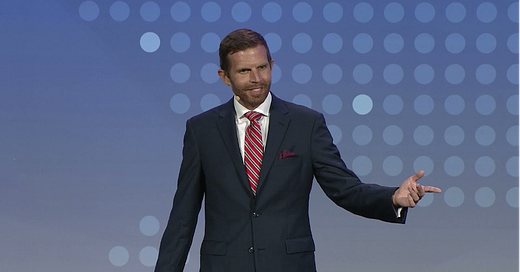Playing telephone with Edmund Burke and JFK
“The only thing necessary for the triumph of evil is for good men to do nothing.”
A few years ago, I gave a speech. In my closing remarks I quoted Irish statesman Edmund Burke: “The only thing necessary for the triumph of evil is for good men to do nothing.”
In my head, after delivering this line everyone shouted, “HUZZAH!”
Afterwords, I stayed around and talked with attendees. One of them was a young attorney. She said, “I really enjoyed your speech, but you should know, Edmund Burke never said that.”
To be honest, this comment didn’t surprise me. You hear all sorts of off-the-wall opinions in post-talk conversations.
Of course Edmund Burke said this. Her comment was the equivalent of saying that Martin Luther King Jr. never said, “I have a dream.”
But I wrote down her comment anyway.
A few weeks later, I reviewed my notes and I see my scribble that said “check Edmund Burke quote.”
I opened my computer, typed in the quote and quickly found out she was right.
Edmund Burke never said that. In fact, nobody ever really did.
It appears it became strangely misquoted by President John F. Kennedy in a 1961 speech to Canadian lawmakers.
JFK just kind of wrote his own phrase.
Which makes sense, because I reread the quote, and realized that it made little sense. Or at best, provided no instruction.
To thwart evil, good men just need to do something. Anything?
Reason alone tells us this is insufficient.
And to make matters worse, I’d just lost one of my favorite closing lines. Nothing but huzzah-less crowds ahead for me.
But a few months later, I stumbled across a twist.
While reading Edmund Burke’s “Thoughts on the Cause of the Present Discontents,” I read a quote that drew me in. It did so in the same way the fake quote had.
Burke said: “When bad men combine, the good must associate; else they will fall, one by one, an unpitied sacrifice in a contemptible struggle.”
Ah-HA!
This is likely the quote JFK attempted to use.
And to me, this is far more interesting.
What Burke said is that we need to associate. To form a group. To come together when we want to solve problems.
Years later, Alexis de Tocqueville would credit the American success story to these groups, known as “mediating institutions.” They are churches, clubs, schools, fraternal groups and other associations.
“Americans use associations to give fêtes, to found seminaries, to build inns, to raise churches, to distribute books, to send missionaries to the antipodes; in this manner they create hospitals, prisons, schools.”
Some Americans start associations, such as the Illinois Policy Institute.
A group of people who are concerned about the dangers and evils of socialism, in all of its forms. We are a group dedicated to empowering people and lifting up the poor and marginalized through the miracle of the free market. We relentlessly defend democracy, freedom and the American Dream.
That doesn’t mean we always win. As Burke said in “Reflections on the Revolution in France”: “Our patience will achieve more than our force” – which is definitely not easy.
It begs the question: What do we do when we are upset and frustrated, when it feels like bad ideas are taking over?
Do we do nothing?
Of course not. We associate.
And we make Edmund Burke proud.
Matt
P.S. While researching this piece, I also found out Martin Luther King Jr. did not originally come up with the phrase, “I have a dream.” He heard it months earlier from a pastor at the Student Nonviolent Coordinating Committee. After her sermon, King asked her permission to use the phrase. Thankfully, unlike JFK, he got the quote right.






The quote came from Walter Reuther President of the UAW!
The quote came from Walter Reuther President of the UAW!